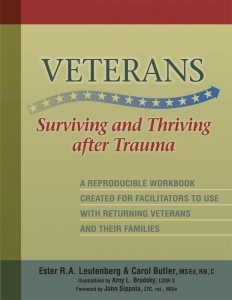May is National Military Appreciation Month
Excerpted from Veterans: Surviving and thriving after trauma
By Ester R.A. Leutenberg and Carol Butler, MS Ed, RN, C
Forward by John Sippola, LTC, ret., MDiv
 Declared by Congress in 1999, May was selected National Military Appreciation Month as a month-long observance honoring the sacrifices of the United States Armed Forces. There are more military related observances during the month of May than any other month, so it is an appropriate time to celebrate the men and women in uniform. During May, we recognize Loyalty Day, VE Day (the end of World War II in Europe on May 8, 1945), Armed Forces Day, Military Spouses Day and Memorial Day.
Declared by Congress in 1999, May was selected National Military Appreciation Month as a month-long observance honoring the sacrifices of the United States Armed Forces. There are more military related observances during the month of May than any other month, so it is an appropriate time to celebrate the men and women in uniform. During May, we recognize Loyalty Day, VE Day (the end of World War II in Europe on May 8, 1945), Armed Forces Day, Military Spouses Day and Memorial Day.
War casts a long shadow. For far too many service members and their families, the initial expressions of welcome, joy and relief are soon overshadowed by hidden wounds to mind, body and spirit. Too many veterans find they are engaged in yet another desperate battle. And, in this hidden war after the war they discover enemies they feel ill-equipped to fight. Aftershocks of war-related trauma and dangerous undertows of depression sabotage their mission for a more satisfying life in community. Moral injury drowns the quest for inner peace, and substance abuse undermines hard-won gains.
Initially, homecoming is happiness, applause and affection, but reintegration to daily life does not resume as they knew it. Veterans, their partners and families have changed. The labor market may not welcome their skills; their finances may plunge. Statistics show alarmingly high suicide and unemployment rates.
Help abounds via the Department of Veterans’ Affairs, Department of Defense, Wounded Warrior Project and numerous governmental and private agencies. Many veterans are reluctant to seek assistance due to the perceived stigma of asking for help; others are too overwhelmed, unaware of available resources, or receive little or no help for other reasons.
As more veterans return from combat, society is increasingly aware of their needs. They will be directed toward professional and spiritual counselors. Veterans differ from other abuse survivors; they have seen atrocities and experienced horrors most civilians cannot comprehend. Their intelligence, determination and resilience that served our country are now needed to save themselves, to heal their invisible and visible wounds.
One of the issues Veterans face is how to problem solve when they are overwhelmed with problems. They often need help finding a way to break their difficulties down to something manageable. The exercise, Problems Can Be Opportunities, will help them discover a way to prioritize their issues and work through a solution…a solution that works for them. A facilitator’s guide is supplied here.
A downloadable version of the exercise “Problems Can Be Opportunities” is found here.
